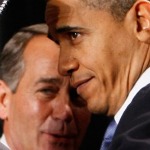Obama and GOP Punt on Deficit Cuts

Pathetic.
Both the President's budget submission today and the House Republican approach to deficit reduction fail to achieve even a modicum of debt stabilization, either in the short run or the long run.
The famed economic historian, Niall Ferguson, said late last year in a major lecture, "Alarm bells should be ringing right now in Washington, D.C." His lecture, concentrating on the relationship of failed empires to fiscal irresponsibility, should be played to every member of Congress and to the President. Clearly, if those alarm bells are ringing, official Washington is deaf.
Sadly, when Ferguson was invited to Washington last year to discuss the dangers of America's debt, only three Members of Congress attended the event.
We hear a number of excuses for the timid reaction of both Congress and the President. Let's look at these "explanations."
First, neither side wants to "go first" in true debt reduction.
Second, the American public doesn't understand the nature of federal spending and needs education.
Third, it's too early in the year and the debt ceiling increase battle will force serious debt and deficit cutting.
Fourth, without Presidential leadership nothing can be achieved.
Let's look more closely at these four excuses.
First, this isn't a game like poker. It's serious business. The notion that neither side wants to reveal their hand assumes that both sides are, secretly, really serious about fiscal balance. A more experienced view is that both sides are playing a public relations game so that if the mess hits the fan, they cannot be blamed.
Second, Americans understand the problem. Government has promised too much during the past 40 years and now doesn't have the money to meet those promises. Like Greece, Italy, Ireland, Portugal, Spain and other developed economies, America's fiscal problems come down to the same old things: medical care, pensions, clumsy tax codes, and demographics.
Third, it may be early in the year, but it's getting late for action. If Congress and the President do what most astute observers suspect-- a series of Continuing Resolutions through this year, a debt ceiling battle that will be characterized more by "process reform" than fiscal reform, and deficits continuing to breach the annual $1 trillion mark--then America will have indeed achieved the grand heights of the PIIGS: debt at more than 100 per cent of GDP, heading for 200 per cent.
Fourth, waiting for someone to lead indicts this entire generation of federal politicians. Rep. Paul Ryan, chairman of the House Budget Committee, has floated at least two major, comprehensive debt and deficit reduction plans. It remains noteworthy that almost no one who is in elective office has bothered to endorse the Ryan plan. When your colleagues begin to move away from you, as though you had a dreaded disease, it's a sign they you wish you weren't around.
The President's budget will "cut" $1.1 trillion during the next 10 years from projected deficits. That's just dandy--it represents a trivial effort since total deficits the next decade will certainly approach if not exceed $10 trillion.
Republican plans, except for Ryan's, play in the same ball park. With full implementation of a CR for FY11 that really does cut $100 billion in outlays from current year spending, the FY11 deficit still reaches $1.4 trillion and the impact over the next 10 years basically mirrors the impact of the President's budget submission--that is to say, almost nothing.
Sadly, national politicians can "kick the can down the road," as the most recent cliché has it. Bond markets seem unlikely to react negatively as long as Fed Chairman Ben Bernanke remains the buyer of last resort of public debt.
When that unnatural state of affairs ends--and no one knows when "the end" appears--the bond markets will begin to demand much higher interest rates when they take on the debt of a nation that has allowed interest payments on its debt to exceed annual spending on national defense.
Bond markets don't care about words. They don't care about the size of your hat--they want to know how much cattle you have.
Right now, America's pastures look pretty empty; but, we have pretty hats on.